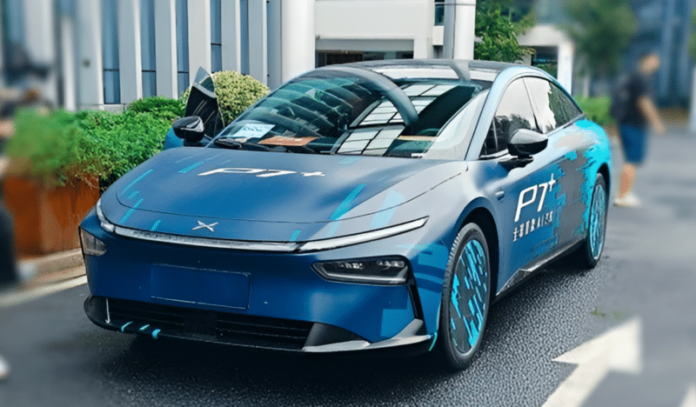Xpeng CEO and founder He Xiaopeng personally drove a camouflaged Xpeng P7+ prototype at the Apsara Conference 2024 in Hangzhou, drawing significant attention from the media. Images from the event reveal the car’s positioning as the “world’s first AI vehicle.” According to previous reports, the P7+ is expected to be officially launched in the fourth quarter of this year, with a pricing strategy likely to be higher than the current P7 model.

The Apsara Conference 2024, held from September 19 to 21, focuses on cloud computing, AI, and future technologies. It features nearly 400 forums and a 40,000-square-meter exhibition space, bringing together industry leaders, tech experts, and innovators to discuss advancements like generative AI and industrial transformation. He Xiaopeng is expected to participate in discussions on AI’s role in advancing autonomous driving technologies at the conference.

The P7+ adopts a sleek front-end design featuring a split headlight setup. The top section integrates Xpeng’s signature light strip, while the lower part houses the main headlamp assembly. Cameras are mounted above the license plate, and millimeter-wave radar sensors are installed around it. The P7+ is expected to use a camera-based vision system for its autonomous driving, moving away from LiDAR technology, similar to Tesla’s Full Self-Driving (FSD) system.

Xpeng’s upcoming P7+ is a significant departure from the P7i, particularly in size. The P7+ measures 5056 mm in length, 1937 mm in width, and 1512 mm in height, with a 3000 mm wheelbase. For comparison, the P7i measures 4888 mm in length, 1896 mm in width, and 1450 mm in height. The new P7+ is expected to be built on Xpeng’s SEPA 2.0 platform, providing greater flexibility and efficiency.

Two powertrain options will be available: a 180 kW motor for the base model and a more powerful 230 kW motor, both produced at Xpeng’s Wuhan facility. The base model weighs 1967 kg, while the higher-spec version weighs 2073 kg. Both versions are expected to offer 18 or 20-inch wheels and a top speed of 200 km/h.

In terms of design, the P7+ features a coupe-style profile that is expected to improve aerodynamic performance and reduce drag. The rear section has a distinctive “C”-shaped taillight design, providing high visibility and a unique look. Cameras are embedded within the rear taillights, and the car includes a small spoiler to enhance its sporty appearance.

The P7+ will use lithium iron phosphate (LFP) batteries sourced from Eve Power. Detailed specifications on the battery pack have not yet been released. Production is expected to take place at Xpeng’s Guangzhou factory, with the car set to launch in the fourth quarter of 2024.
By showcasing the P7+ at the Apsara Conference, Xpeng highlighted its continued focus on integrating AI into smart driving technology as it prepares for the car’s official release later this year.

Xpeng’s current offerings include the P7i, P5, and Mona M03 sedans, the G6 and G9 crossovers, and the X9 minivan. The P7i, once Xpeng’s best-selling model, has recently seen a decline in sales, positioning the P7+ as a potential successor aimed at revitalizing the brand’s electric sedan segment.


